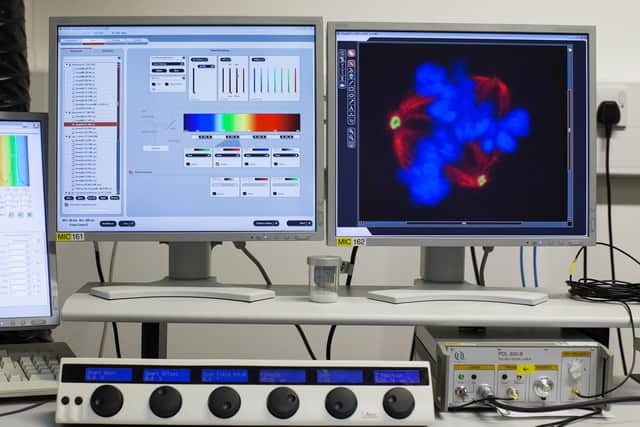Thousands of cancer cases undetected each week due to Covid-19 crisis
Cancer Research UK found the number of urgent referrals by GP have dropped to about 25 per cent of usual levels.
This is down to fewer people going to see their GP and also due to practitioners’ reluctance to send patients to hospital due to the risk of Covid-19 infection, the charity said.
Advertisement
Hide AdAdvertisement
Hide AdThe organisation said screening services have been formally paused in Scotland, Wales and Northern Ireland and are “de facto” paused in England as no appointments are being made at screening hubs.


Previously these services were screening around 200,000 people each week for diseases such as bowel, breast cancer and cervical cancer across the UK, picking up an average of 2,250 cases.
Cancer Research UK estimates the situation could jeopardise the recovery of thousands of people as early-stage cancers are significantly easier to treat and the numbers of new cases are stacking up each week.
In analysis on its website, the body said doctors were concerned early stage cancers were being “parked” for three months or more.
After this point, the chances of curative surgery to remove all of the cancerous tissue – reducing the need for chemo or radiotherapy – becomes less likely.
Cancer Research UK is now calling on the NHS to develop a plan to dramatically ramp up screening services to deal with the backlog of cases once it is safe to do so.
Professor Charles Swanton, chief clinician at Cancer Research UK, told Radio 4’s Today Programme the UK Government needs to urgently deliver on its promise to create “Covid-free” hubs in private hospitals.
“In some parts of the country that is definitely happening, patients are having Covid-19 screening 48 hours prior to surgical admission,” he said.
Advertisement
Hide AdAdvertisement
Hide Ad“What is not happening routinely right now – although there are promising signs – is the routine screening of all staff, not just symptomatic but asymptomatic staff, in an effort to create truly coronavirus-free cancer hubs.
“The truth is, in medicine total certainty is very difficult, but we can minimise risk and minimising risk requires testing, testing, testing.”
Health secretary Matt Hancock has urged non-coronavirus patients requiring urgent care to seek help immediately, saying “the NHS is there for you”.
Speaking in the House of Commons yesterday, Mr Hancock said those who were unwell must not let fear of Covid-19 stop them contacting their GP.
His comments came after research from one of the UK’s leading cancer charities found 2,200 new cases of cancer could be going undetected each week.
Mr Hancock said he could not guarantee all cancer treatment would go ahead as there were some treatments that were “clinically inadvisable” due to the risk of catching Covid-19.
He told MPs: “There is some cancer treatment that it is clinically inadvisable to undertake during an epidemic because if you take somebody’s immune system down to very low levels then that puts them at significant risk.
“So I can’t give the guarantee that all cancer treatment will go ahead because, even though we have capacity now in the NHS and we are confident that capacity will not be overwhelmed by the virus, the virus is still at large in the community, so there are some cancer treatments that it is clinically inadvisable to undertake now, especially around immunotherapy.”
Advertisement
Hide AdAdvertisement
Hide AdProf Swanton said the risk of not going to a doctor was much greater than seeking medical help and potentially catching coronavirus.
The existing situation is having a particular impact on the diagnosis of lung cancers – the most common cause of cancer death – for fear of spreading Covid-19 to healthcare staff, Cancer Research UK said.
Cancers that require invasive tests such as endoscopy, bronchoscopies and guided biopsies are also going undetected, the charity said.
The body further warned urgent surgeries were being delayed in many parts of the country due to a lack of recovery beds, with ventilation and no intensive care beds if surgery were to go wrong.
Comments
Want to join the conversation? Please or to comment on this article.